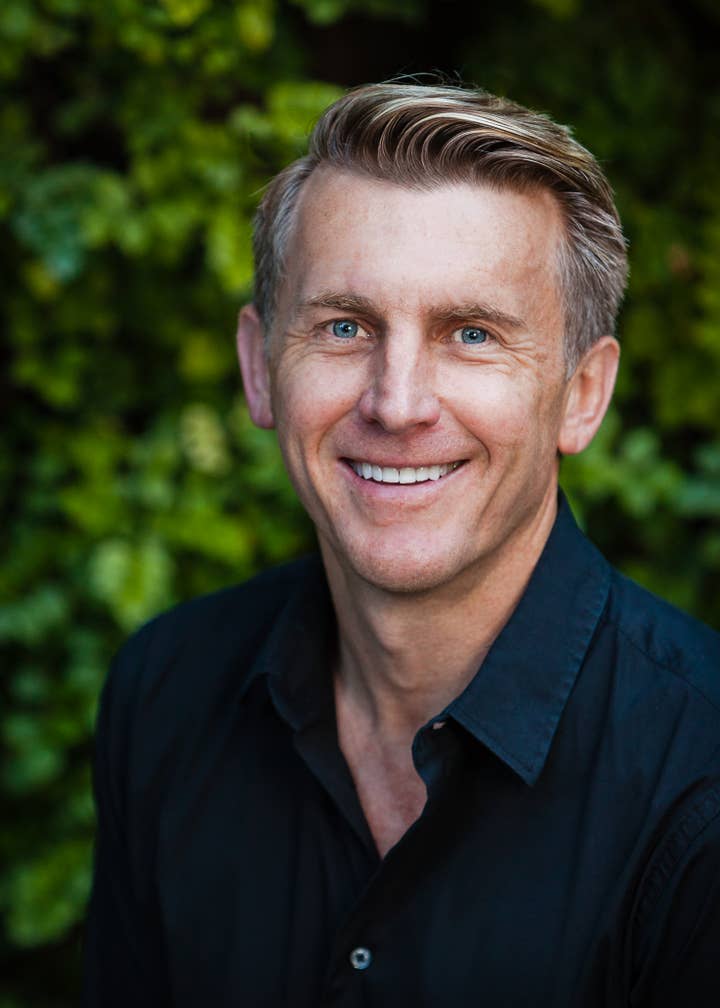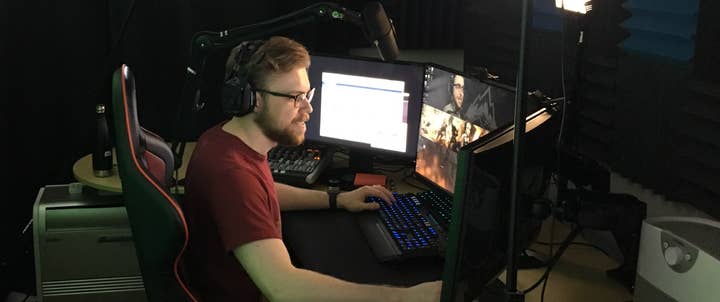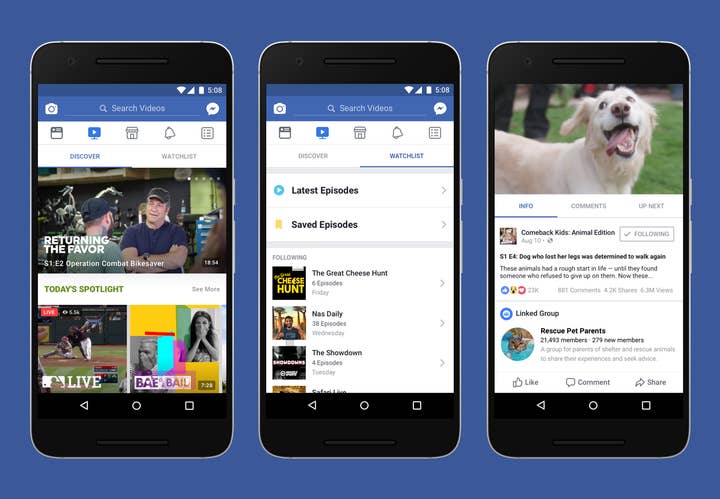Can Facebook catch up to Twitch and YouTube?
Director of games partnerships for the Americas Guy Cross talks us through the social network's ambitious plans to attract more streamers and content creators
Earlier this year, Facebook announced its Gaming Creator Pilot Program, an initiaitve designed to attract aspiring PewDiePies to the leading social network.
The move, we're told, is actually part of a "broader gaming video strategy, which fits into a broader games platform strategy for Facebook" - which is itself part of the plan to evolve Facebook into a "video-first company".
The first steps were taken last year, with the rising number of esports partnerships Facebook secured, scoring exclusive rights to coverage of Paladins, Counter-Strike: GO and official ESL tournaments - and this is expected to continue. In fact, last year the company told GamesIndustry.biz it was going "all-in on esports."
Now the social network is keen to get content creators on board, to identify and nurture future stars. Just as the growth of YouTube and Twitch are driven in part by their most popular channel hosts, Facebook hopes to foster talent that draws more viewers to its own platform - and be a key influence in shaping it.

"We're looking for partners who have proven they can connect with people and established communities but are also willing to help us design the platform going forward," Guy Cross, director of games partnerships for the Americas, tells GamesIndustry.biz.
"We want to build something very special and unique that taps into existing tools that we have, but also ties into creating new experiences that play to Facebook's strengths. It's going to be a real collaboration."
He continues: "Gaming video creators are an awesome constituancy to finally welcome with open arms to the platform... We did a bunch of experimentation in the last year, which gave us a lot of great insight from the community that gave us a lot of reason to want to invest further in this space."
Facebook is also keen to expand on the diversity of content creators available, not only in terms of gender, race, sexuality and other aspects of life, but also in the videos they create. While Twitch, for one, is dominated by streams around titles that appeal to a core audience, Facebook wants to see creators covering all types of games - after all, it has the broadest audience of any social network, with a much wider range of tastes and needs.
Cross divides the goals of the pilot program into "three major work streams". The first is identifying how Facebook can help these creators build large communities around their content. Not only does Facebook have 2.2 billion monthly active users (as of Q4 2017), these users are well accustomed to interacting with the content delivered via their feed.
"We need to play catch-up and make sure that we offer very good services that you would expect to see on other platforms, but also figure out how we can make the whole business of becoming a creator easier"
The second is growth and ensuring that creators establishing themselves on Facebook have long-term opportunities. For this, Cross says Facebook is "leveraging some technology that helped us build what still is a multi-billion dollar business around casual gaming", essentially applying some of the learnings that made titles like FarmVille a global phenomenon back in the day.
Finally, Cross says the firm is determined to "innovate and bring something new to the industry". Fancy words perhaps, and ones that have proved to be empty from multiple companies in the past, but they indicate that Facebook is all too aware of its biggest challenge: the long-established dominance of Twitch and YouTube.
"We need to play catch-up and make sure that we offer very good services that you would expect to see on other platforms, such as a variety of monetisation options, but also figure out how we can make the whole business of becoming a creator easier," Cross explains. "We can make going live and the set-up that you need, the configuration much easier, simpler and cost effective. Then we can make interactions better."
The company has been working on implementing key features as soon as possible, such as the ability for viewers to donate money directly to the creators. Anyone in the pilot program also has the option of 1080p video quality, and Cross says there is a "huge pipeline of features that we are already working with creators on".
It's an amibitious goal, but will these efforts prove fruitless given the hold both Twitch and YouTube have over the content creation scene? Facebook may recognise it needs to catch up, but can it actually do so?
"It's not too late," says Cross. "We think we have a lot of work to do and we are working at a furious pace."

The most encouraging thing, he tells us, is the support from Facebook's established partners in the games industry. He claims this is something echoed across meetings with everyone from the AAA developers to esports broadcasters and leading influencers.
"There's a real desire to see Facebook come into the market for our partners... A lot of [them] feel like their growth on other platforms has levelled off, and they are hungry to reach new audiences"
"There's a real desire to see Facebook come into the market for our partners," he explains. "They think there is untapped growth that is available. The gaming ecosystem is massive. There's between one and two billion monthly active people playing games. It's an opportunity to become part of that growth.
"A lot of partners feel like their growth on other platforms has levelled off, and they are hungry to reach new audiences. Facebook's [userbase] is big and growing, and we have a huge community of gamers among them. There are 800 million who play Facebook-connected games every month, and that's not even counting how many people are on Facebook gaming groups, gaming pages and who watch gaming video on Facebook. That's the real opportunity."
However, the greatest challenge Facebook faces is shifting that community's perceptions. The social network is not viewed as a destination for video content - at least, not in the form that most influencers produce. Minute-long subtitled clips that appear alongside all the selfies, culinary brags and other posts in any user's feed are a far cry from the lengthy livestreams and video essays that populate Twitch and YouTube - something Cross is quick to acknowledge.
"Facebook as an experience isn't necessarily where you'd go or think of for a long-form sit-down consumption experience," he admits. "People are used to dropping in and out and over the course of a day. They are using Facebook a tonne, but in smaller snippets that add up. We have some work to do to get our community educated and aware that they can find this richer longer-form experiences.
"There's a broader company effort around video overall, and there's a new service area called Watch, where we only show longer-form content. We are trying to build a habit and an expectation with our community - this is where you go if you want to really sit down for a long period of time and experience high-quality content."
Fortunately, Facebook has previous experience here. Originally started as a network for socialising with friends and sharing thoughts, messages, images and the like, there is one other activity that has come to be synonymous with the site - one that bodes well for its plans to attract more games enthusiasts.
"If there is one experience that's proven on Facebook for almost ten years now, it's playing video games," he says. "That area has been home to hundreds of millions of people playing games for many years, to the tune of billions of dollars of engagement. The average time spent even today by the people that play games is 40-minutes plus.
"So we do have experience of building a long-form content consumption experience on Facebook - it just looks a little bit different. We need to borrow from what we have learnt from that experience and then combine it with what we are learning around video."
When it comes to attracting influencers or even viewers that are most enthused by AAA games, Facebook is perhaps at a disadvantage. Both Twitch and YouTube have apps and integrations on Xbox and PlayStation, allowing users to broadcast or share clips from the comfort of their couch. So far, Facebook's integration is centred around importing your friends to connect more easily with fellow gamers.
But Cross stresses that this type of connection is still important, pointing to how PC players are logging into their Facebook accounts through the likes of Riot Games' client or Blizzard's Battle.net. The result is great visibility for Facebook among both gamers and games firms alike, a foundation on which the company is determined to build. And as the amount of video content on Facebook grows, you can be sure the firm will be pushing it through as many devices as possible.
"People are used to dropping in and out and over the course of a day. We have some work to do to get our community educated and aware that they can find this richer longer-form experiences"
"We do have a Facebook-connected TV app that exists on Samsung, Amazon Fire and Apple TV," says Cross. "You can expect that long-form video consumption experience, that service area, might exist in other platforms in the future. We [would] like to be in more places as a destination where you might come to discover video, and we are working towards that.
"I'm looking forward to chatting with you in the coming months because we are looking at creating some new experiences, new service areas that will bring gaming video and gaming content overall to the forefront, mixing it together with community and providing some unique experiences around that."
By far Facebook's biggest advantage is what Cross dubs the "power to share". The audience is already trained to spread content virally, and the firm expects this to greatly benefit its creators. Publishers, developers and media outlets already use the social network to promote their latest trailers and gameplay clips, which are often shared by the 800 million games fans using the platform.
The potential for creators to be part of this has already been proven. Facebook has been working closely with streamer StoneMountain64, among others, in the run-up to this program. A fan of Battlefield, he streams his matches every weekday at a set time and Electronic Arts often shares his broadcasts, which has not only grown his audience but opened him up to various new partnerships. Facebook hopes to replicate this effect for other creators - but, crucially, without spamming gamers' feeds.
"Feed is where people go, that's their home base," Cross explains. "In the past, we were rather blunt. We'd let developers share their content and the oversharing that happened turned people off. Facebook learnt its lesson: we should have been more intelligent, we should have been more thoughtful about how we connect people to content. Are they interested in this genre? Do they own that platform? Is there a Page or a Group around a game or an esport or a creator that they follow?

There is one last concern in creating a new platform for content creators: toxic behaviour from the audience. Both Twitch and YouTube continue to struggle with abusive comments and controversial content, and while Facebook users aren't protected by the same anonymity they enjoy on those sites, Cross says the firm isn't taking any chances.
"Just because you have your real identity associated with your account or what have you, it doesn't meant that people don't have tendencies to let fly at certain points," he acknowledges. "We need to be very aware of that at. We definitely are holding our creators, our partners accountable to our community standards that have been in play since the start of Facebook.
"If there is one experience that's proven on Facebook for almost ten years now, it's playing video games. Hundreds of millions of people playing games for many years, to the tune of billions of dollars of engagement"
"Our statements of rights and responsibilities is what governs our content and I generally think that that's probably more in line with where some of the platforms are taking their community standards now."
Cross tells us Facebook recently launched a program to support community leaders and train them on how to manage their audieces better, while it has also invested a lot in moderation and tools to assist with these efforts. It is even adding 3,000 new people to its community operations program.
"This isn't just a gaming problem, it's an overall challenge that any social network and certainly any video platform is going to need to tackle," Cross says. "We are bringing on literally thousands of new people to review content as it is loaded up, and we're making massive investments in technology that reviews videos for everything from copyright infringement to other sorts of content that's not appropriate for our community standards. The games team will be part of that."
Even with this investment and the potential for growth, it's impossible to understate how difficult it will be for Facebook to achieve its goal. According to a recent report, Facebook was host to 27,500 active streamers in the last quarter of 2017 - meanwhile, Twitch and YouTube were home to 814,000 and 293,000 respectively.
Yet Cross remain optimistic, believing the social network's experience in establishing a games platform puts it in good stead to add long-form video to that offering.
"This is a reinvention of our games business with all the lessons learnt and a lot more investment to take it forward," he concludes. "We're definitely watching other platforms out there and seeing how they succeed or stumble, and we try and make sure that we leverage that hindsight to the best of our ability. It's going to take some time, but even last year in some of the deep testing that we did, with all these challenges, we are still making really great progress."
